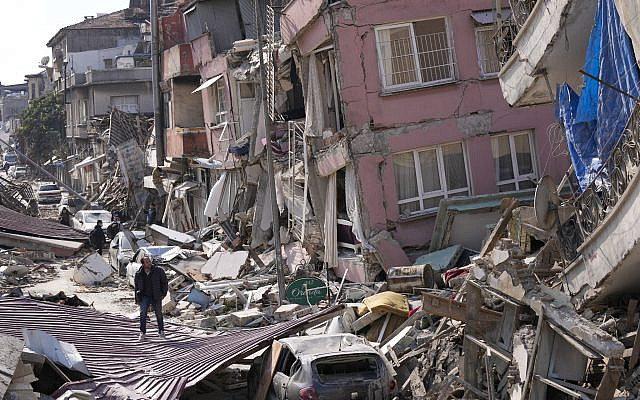When a rabbi knows why earthquakes devastated Turkey and Syria
 |
| שמואל אליהו הקטן |
The death toll from the earthquakes that have rocked Syria and Turkey is comparable to that of the Lisbon earthquake of 1755. Back then, representatives of organized religion were quick to see the event as a manifestation of divine judgment, while the thought of moderns like Voltaire, Rousseau, Kant, and others was deeply affected by news of the devastation.
Crude religious interpretations of earthquakes are not simply a thing of the past. Rabbi Shmuel Eliyahu, the chief rabbi of Safed in Northern Israel, has often voiced profoundly reprehensible opinions. It now looks as though he is aiming to break his own record, his personal worst. In the most recent edition of Olam Katan, a National Religious publication, the name of which appropriately translates as “small world,” Rabbi Eliyahu has written an opinion piece entitled “How to Relate to the Earthquakes in Turkey and Syria.”
In Rabbi Eliyahu’s view, the explanation for the death of many thousands and the egregious suffering of so many more can be attributed to the acts of aggression perpetrated by these peoples towards the Jews. He does acknowledge that the anguish of our near neighbors is appalling. But, he adds in order to encourage his readers, we should continue to be full-throated in our praise of God Who protects us and metes out judgement upon our enemies.
It is hard to know where to start in responding to this abominable argument. For one thing, it makes his theology a hostage to geology. If (as seems likely sooner or later) an earthquake strikes a little further to the south of the Syrian-African rift, it will be necessary for Rabbi Eliyahu to explain why the actions of Israelis have incurred divine displeasure. My guess is that he may already have prepared a list of self-haters, backstabbers, and heretics to be blamed in such an eventuality. If (perish the thought) an earthquake hits here in Israel, he will wheel out some hokey theodicy designed to preserve his own certainties and condemn the rest of us to punishment for our sins. Disasters may vary, but glib explanations for them stay the same.
This kind of reasoning is offensive, of course, to those caught up in the sheer desperation of this natural disaster. It is also an offence to Judaism itself. It’s not that Rabbi Eliyahu cannot find views across three millennia and more of Jewish expression that support his approach. Small World Thinking can always find some good quotes. But it is worth remembering that, in citing these sources, he has made a choice. If only he would stand up and say: our fellow human beings and close neighbors are in crisis, and we should mobilize to help. I promise he could find some excellent quotes for that position too.
Writing one thousand years ago, Rabbi Bahya ibn Paquda insisted that it is not appropriate to wait for divine instruction in order to know how best to serve God. That is a decision for each one of us to take. In opting to see the victims as pawns in some inscrutable plan, in preferring to hear the dull monotone of self-justification over the plaintiff call of persons in need, Rabbi Eliyahu has made his choice. If his approach goes unchallenged, our Judaism will be too small for the great challenges the world now face.
Rabbi Eliyahu is not alone in responding the widespread loss of innocent life with a mix of smugness, self-obsession and myopia. This earthquake, I would tell Rabbi Eliyahu if I thought he might be able to hear me, is not about us. We are not at the epicenter of this story. We felt the tremors here in Israel, but the question for us and for others around the world is: can we hear a moral imperative addressed to us in the face of so much suffering? Can we set aside our parochial agendas and stand in solidarity with those who lie in ruins?
I heard another rabbi (not one that Eliyahu would grace with that title) address the earthquake this week. Rabbi Janner-Klausner spoke on the BBC, and mentioned the originator of Rabbi Eliyahu’s surname, the biblical Elijah. It was he who spoke of God’s voice to be found not in cyclonic wind, nor in seismic roar, not yet in fire, but in a still small voice.
Ingeniously, she noted that rescuers and disaster-responders need silence so that they can listen out for the still small cries of survivors. Just as their voices may penetrate the silence, so each of us is called to respond in the face of senseless suffering and distress on an epic scale. It is our voice — of response, of solidarity, of concern — that is called for.
That’s what I call an apt Jewish response to unspeakable suffering.
Here in Israel, we are caught up in another kind of earthquake, as the foundations of our democracy and judiciary are under threat of collapse. Here, too, established religion in Israel finds itself too often on the wrong side of the debate, justifying the contemptible and whitewashing the corrupt.
It is time to eschew offensive religious clichés, and to listen out for a stiller, smaller, truer voice. As buildings teeter and institutions are rocked, we need to articulate a Judaism of fundamental human empathy — not for the sake of popularity, nor for the sake of diplomacy. For God’s sake, and for the sake of God’s vulnerable creatures, beyond denominational affiliations and variations in practice and custom, we need to reject a Small World Torah.



